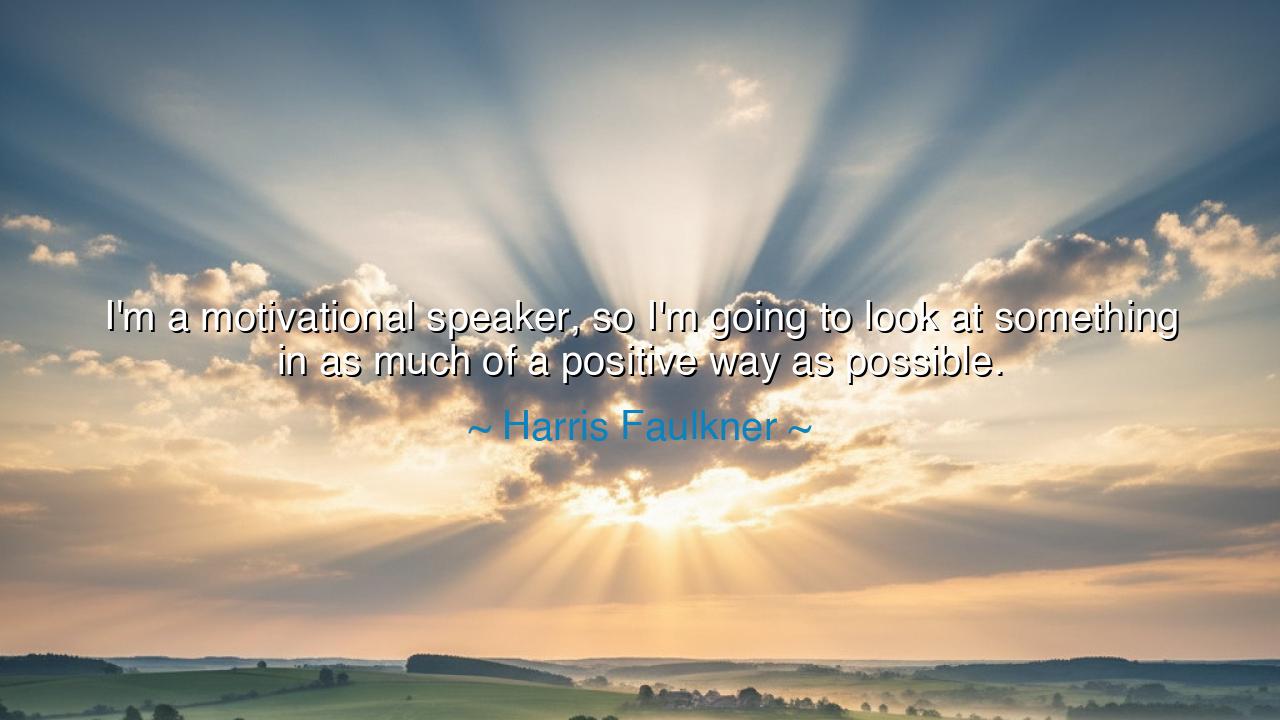
I'm a motivational speaker, so I'm going to look at something in
I'm a motivational speaker, so I'm going to look at something in as much of a positive way as possible.






In the words of Harris Faulkner, we hear a declaration that is both a calling and a creed: “I’m a motivational speaker, so I’m going to look at something in as much of a positive way as possible.” This is not mere optimism for its own sake, nor the naïve refusal to see hardship. It is the conscious choice of one who understands the weight of words and the fire of perspective. For to be a speaker of motivation is to bear a sacred duty: to look upon the trials of life and, instead of despair, to summon hope, to turn ashes into embers, to remind weary hearts that dawn still comes.
When she calls herself a motivational speaker, she does not claim the role of prophet or sage, but of one who serves. The ancients taught that the tongue may be as mighty as the sword, for it can cut or it can heal, it can enslave or it can liberate. To speak motivation is to choose healing over harm, to lift instead of to crush. And in her words, Harris reveals the heart of her craft: not to deny darkness, but to always search for the flame that burns within it.
Consider the example of Winston Churchill during the darkest days of World War II. When bombs fell upon London and despair spread like smoke, he stood before the people not to tell them it would be easy, but to give them a vision of endurance. “We shall fight on the beaches,” he said, words that rang like iron across the world. His genius lay not in pretending danger was absent, but in framing it with defiance and courage. He was not blind to reality—he was choosing to look at it in the most positive way possible, as a challenge that could be overcome. So too does Harris Faulkner embrace this eternal art.
There is a heroism in such vision. To look at calamity and see opportunity, to look at wounds and see lessons, to look at endings and see beginnings—this is the labor of the soul. Many will call it foolishness, for it is easier to surrender to despair, to cloak oneself in cynicism. But those who choose the positive way carry light into the caves of others. They are as torches, not for themselves only, but for all who walk behind them. Harris speaks as one of these: she chooses to see with eyes of hope because others, too, depend upon her sight.
The meaning of her words stretches beyond the stage. Each of us, whether we speak to many or to one, is a motivational speaker in our own sphere. Every word we utter, every perspective we offer, shapes the spirits of those around us. A child hearing encouragement grows braver. A friend hearing comfort grows stronger. A community hearing hope grows united. Thus, to choose positivity is not merely self-help—it is service.
And yet, let us be clear: positivity is not the denial of pain. The ancients knew well that grief, loss, and struggle are woven into the fabric of existence. But positivity is the choice to face those realities with dignity, with courage, and with faith in the possibility of transformation. It is the art of saying, “Though this wound hurts, I will rise; though this storm rages, I will endure; though this night is long, the sun will return.” This is the power Harris speaks of, the power that belongs not only to great leaders, but to all who choose it.
Therefore, let the lesson be this: in your own life, become a speaker of hope. Do not let bitterness be your only tongue, nor despair your only voice. Practice daily the art of reframing: when hardship comes, ask, What strength can I gain from this? What lesson is hidden here? How might I turn this trial into a testimony? In this way, you do as Harris Faulkner teaches: you look at life in as positive a way as possible, not because it is easy, but because it is necessary.
For the truth is eternal: men and women do not rise by accident—they rise because someone, somewhere, chose to speak light into their darkness. Be that voice. Carry that torch. And one day, others will say of you, as we now say of Harris Faulkner: “This one did not give in to despair, but spoke life from the heart—and in doing so, gave strength to many.”






AAdministratorAdministrator
Welcome, honored guests. Please leave a comment, we will respond soon